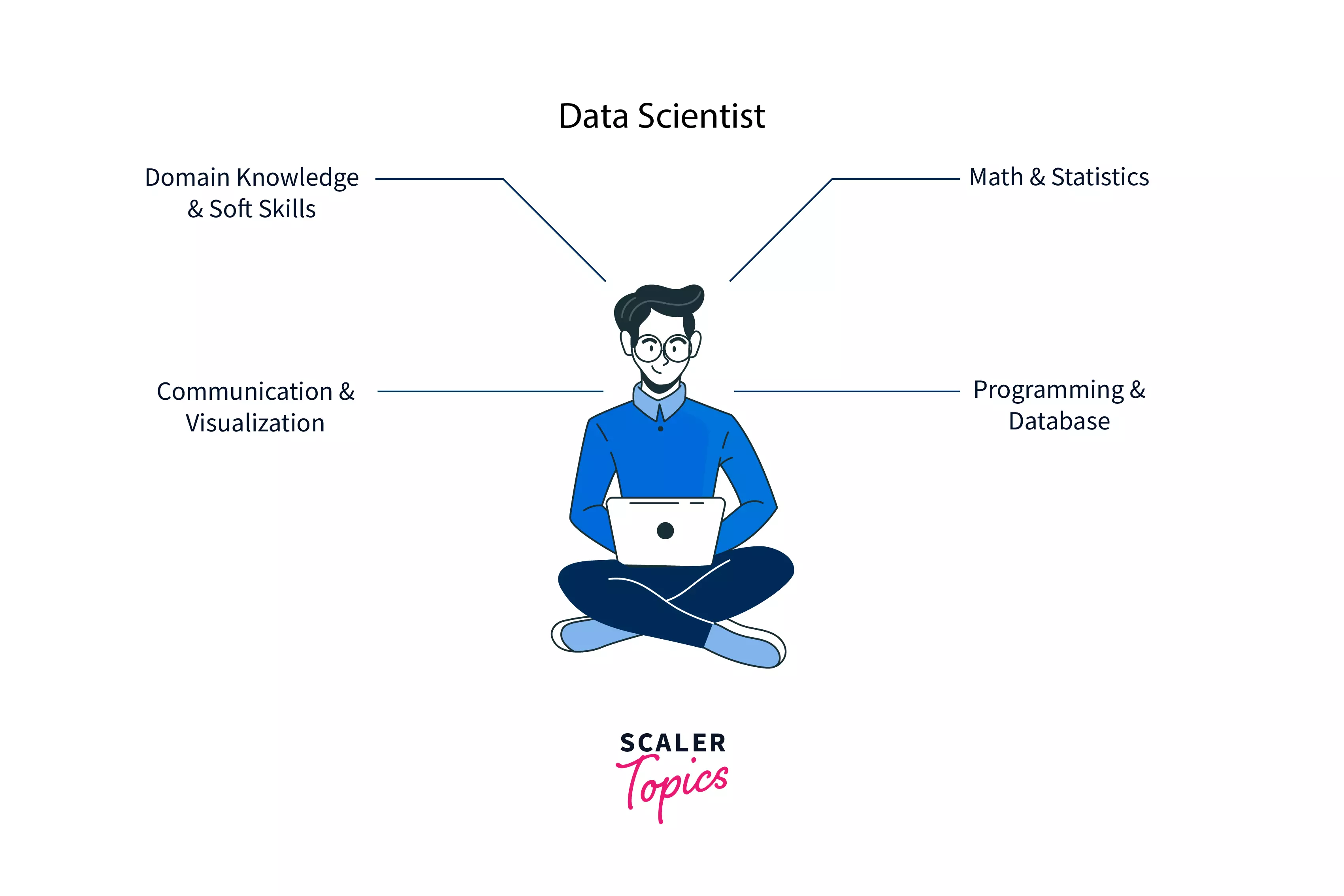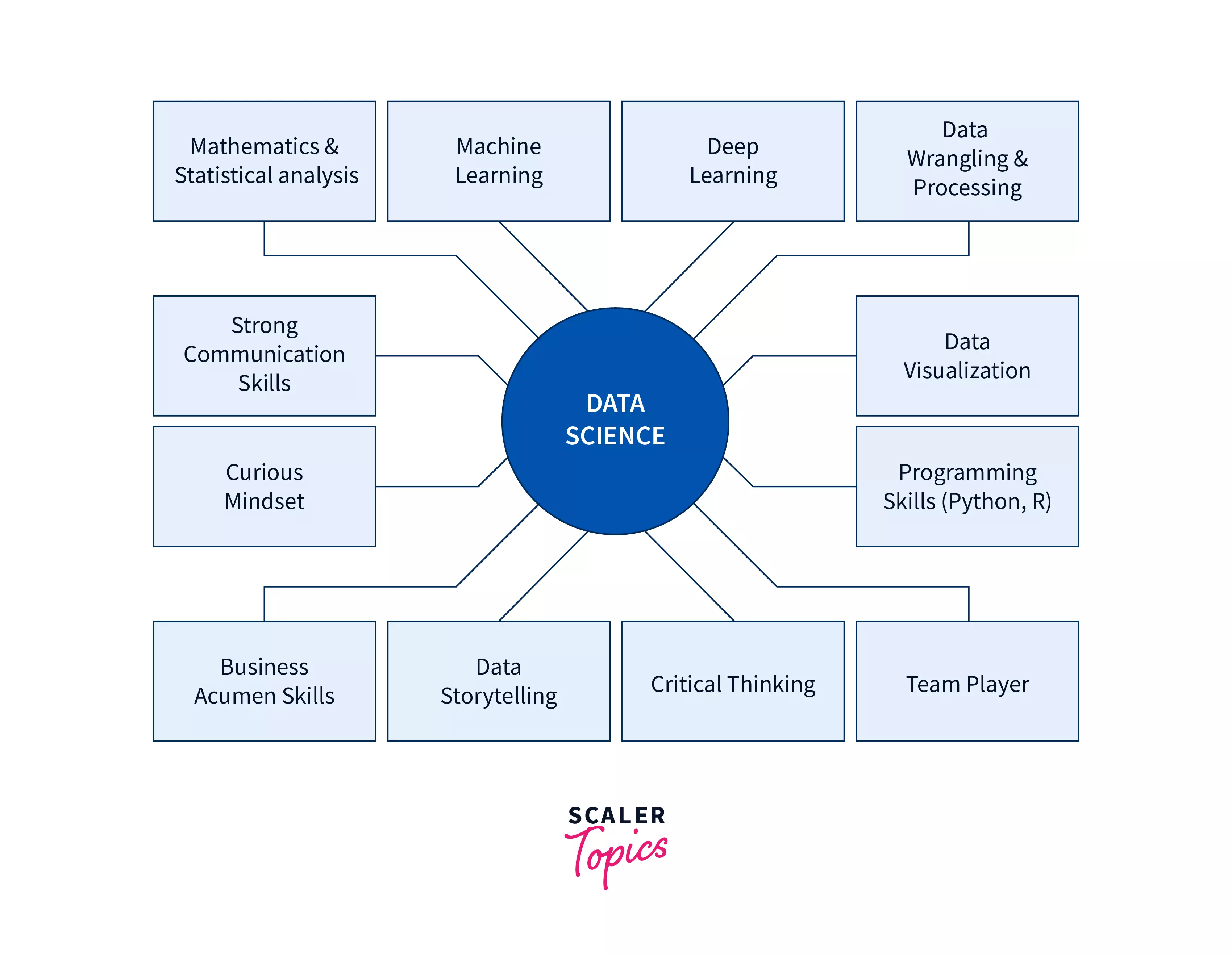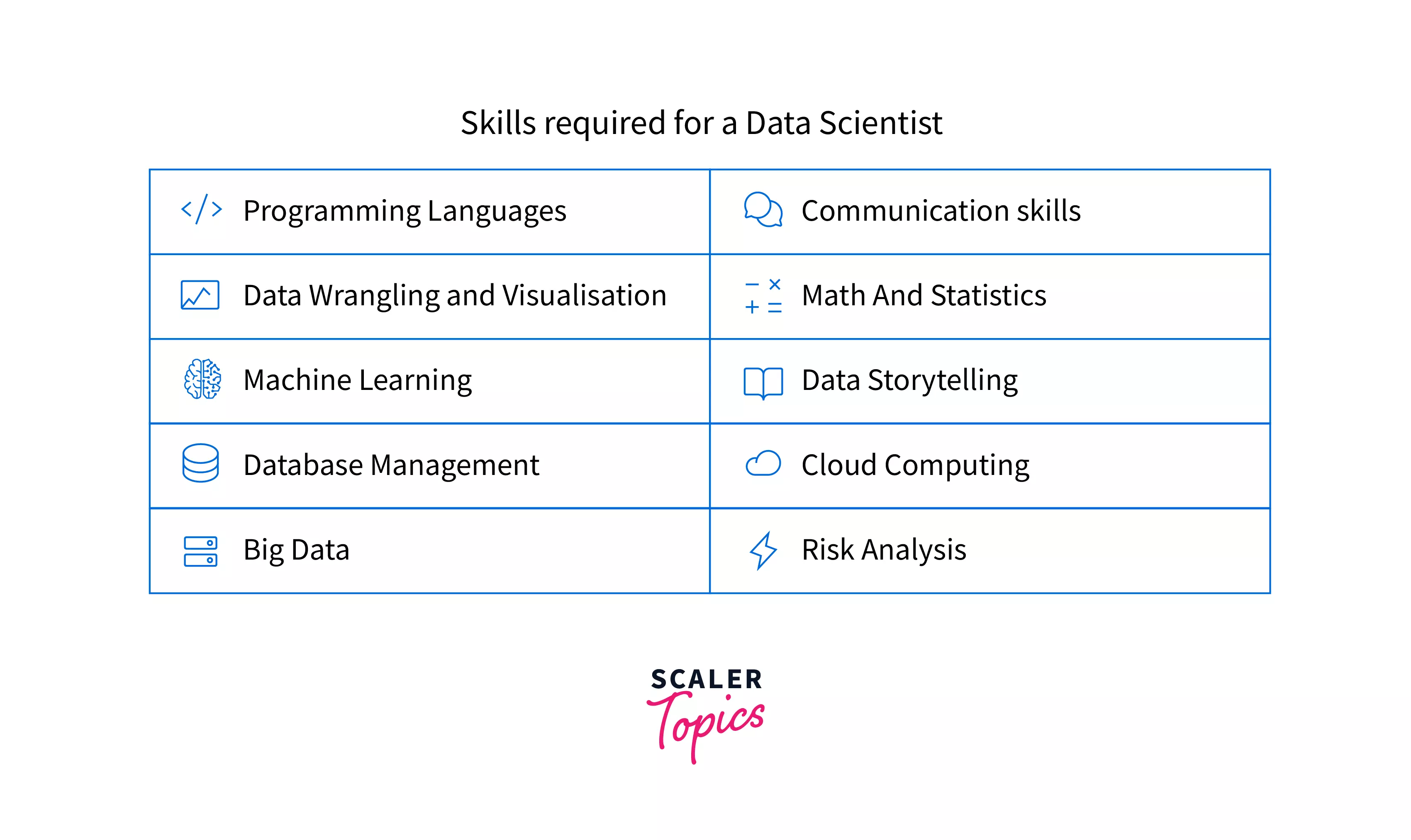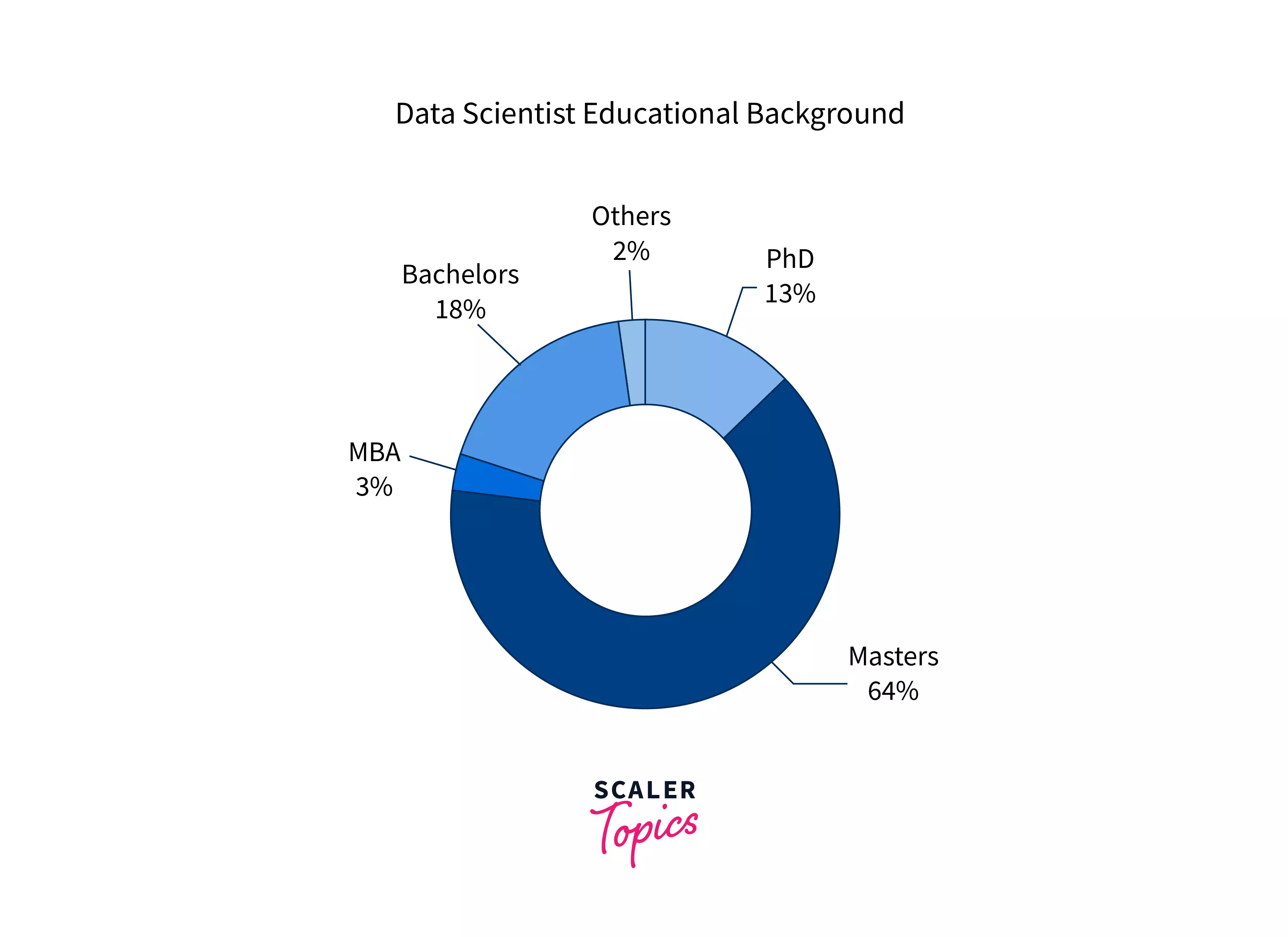How to become a Data Scientist in 2023?
Learn via video course

Introduction
In the 21st century, data has become the most precious asset for any organization worldwide. As organizations are moving towards digitalization and cloud-based technologies, they are generating a huge volume of data on a daily basis, and it has become paramount for them to process this data and extract actionable insights out of it for their success and growth.
This has resulted in the demand for Data Scientists skyrocketing in recent years. Data Scientists are the practitioners of the Data Science discipline. They are responsible for extracting valuable insights by examining large amounts of data residing in the organization's repositories to drive various business decisions. Data Scientist has already been regarded as the sexiest job of the 21st century by Harvard Business Review. And for three years in a row, it has been named the number 1 job in the USA by Glassdoor.
The future of Data Science is also quite promising. The U.S. Bureau of Labor Statistics estimates a 22 percent growth in Data Science jobs during 2020-2030, substantially higher than the 7.7 percent growth for other occupations. The World Economic Forum has identified Data Science as one of the fastest-growing jobs in the next decade.
Also, Data Scientists are among the most paid professionals worldwide. Whether you are a student or an experienced professional, building a career as a Data Scientist could be a smart move as this profile offers a promising career path and attracts high salaries.
However, to become a Data Scientist, there are a certain set of skills you need to learn and a few other steps that you have to follow. In this article, we will provide a comprehensive guide on how to become a Data Scientist.
Who is a Data Scientist?
- Data Scientists are professionals in the Data Science field who apply advanced analytical and scientific methods to a large amount of data to help organizations become data-driven in their decision-making and strategic planning. They collect, process, and analyze large amounts of structured and unstructured data from a business point of view and apply Data Science methods such as statistics, machine learning, etc. to derive valuable insights that can help drive business decisions.
- Data Scientists bring together concepts of software engineering and statistics to convert raw data into meaningful and actionable information.
- Data Scientist was a completely unknown term just a decade ago, but as businesses have realized the true importance of data, they have become increasingly common, and their demand is growing rapidly.

How to Become a Data Scientist?
Demand for Data Scientists has skyrocketed in recent years and is expected to be there in the next decade. Therefore, there are abundant job opportunities to build a career as a Data Scientist. Whether you are a student planning to build a career as a Data Scientist or experienced professional planning to pivot your career in this field, it could be a great move as it offers a promising career path and attracts high salaries.
If you want to become a Data Scientist, you should consider the below steps to start your career in this field -
- Pursue a degree (bachelor's/master's) or a course in Data Science or a closely related field
- Learn and master various technical and soft skills required to become a Data Scientist
- Prepare for the interview for an entry-level Data Scientist job.
- Consider having Data Science certifications or courses.

If you are interested to become a Data Scientist, you can check out Scaler's Data Science Course.
Data Scientist Job Description
Working as a Data Scientist can be intellectually challenging, analytically satisfying, and put you at the forefront of new advances in technology. While responsibilities for a Data Scientist may vary depending on the organization, there are some fundamental responsibilities for a Data Scientist that is generally common across organizations -
- Understanding Business Problems - Data Scientists collaborate with various business stakeholders to understand business requirements and define problem statements.
- Data Collection - Post understanding business requirements, Data Scientists, define problem statements by translating these requirements into Data Science problems. To solve them, Data Scientists identify relevant data sources and utilize various programming languages and methods, such as Python, SQL, Web Scraping, APIs, etc., to collect large amounts of raw, structured, and unstructured data.
- Data Preparation - After data collection, Data Scientists apply various statistical or analytical methods such as discarding irrelevant information, imputing missing values, and handling outliers to clean and prepare data that can be used in further analysis.
- Exploratory Data Analysis (EDA) - Post cleaning of data, Data Scientists perform Exploratory Data Analysis (EDA) by applying various statistical (correlation, mean, mode, etc.) or visualization methods (scatter plots, histograms, bar charts, etc.) to discover underlying patterns in the data.
- Feature Engineering - It is the process of identifying the most impactful and relevant features from the raw data by applying business domain knowledge. These engineered features can help in boosting the accuracy of the developed ML models.
- ML Model Development - Developing ML models is the most important and visible aspect of a Data Scientist's job. Data Scientists use various programming languages and tools such as Python, R, and Scala, etc. to develop machine learning-based predictive or prescriptive models.
- Communication - After insights are derived, Data Scientists are responsible for communicating their findings to the business management. They also recommend changes to existing business processes and strategies based on derived insights.
Difference between Data Scientist & Data Analyst
It is very common to confuse the role of a Data Scientist with that of a Data Analyst. While both of these profiles share overlapping responsibilities, there are some significant differences between these two roles. It is crucial to understand these differences to decide which role might be the best career choice for you.
Data Analysts are responsible for applying statistical and visualization methods to prepare dashboards, charts, reports, etc., by collecting and processing the data using basic programming languages. They mostly deal with structured data. For example, a Data Analyst can analyze a marketing campaign's effectiveness by keeping track of multiple KPIs and metrics. This analysis can help businesses understand the success of their products with respect to various age groups and demographics or otherwise find consumer patterns.
While Data Scientists are responsible for collecting and processing structured and unstructured data, cleaning and preparing them in a usable and understandable format, they apply advanced programming languages and tools to build and develop predictive or prescriptive models. For example, a Data Scientist can develop a consumer segmentation approach to understand consumers' purchase behavior with respect to demographics or age, which can help businesses develop improved marketing strategies.
We have created a table below to help understand the difference between these two profiles based on multiple factors.
| Factor | Data Analyst | Data Scientist |
| Definition | Data Analysts employ basic statistical analysis to create reports and dashboards to derive insights into known business problems. | Data Scientists apply advanced analytics techniques to clean and process data to build predictive models for known and unknown business problems. |
| Job Responsibilities | Collect, process, and analyze structured data | Collect, process, and analyze large amounts of structured and unstructured data |
| Analyze data using Excel, statistical techniques, or visualization software such as PowerBI, Tableau, etc. | Data cleaning, Exploratory Data Analysis (EDA) using statistical and visualization methods, feature engineering | |
| Build dashboards for reporting use | Build predictive and prescriptive models | |
| Education | Mostly Bachelor's is sufficient | Master's or Ph.D. is preferred |
| Tools | PowerBI, Tableau, Microsoft Excel, Google Analytics, etc. | Spark, Hadoop, GCP, SQL, NoSQL, Jupyter Notebook, Tableau, etc. |
| Skills Requirement | Basic Statistics and Mathematics | Advanced understanding of Statistics and Mathematics |
| Basic understanding of Python and SQL | Strong knowledge of Python, R, Scala, SQL, etc. | |
| Statistical Analysis and Regression, Visualization software | Data Visualization, In-depth understanding of Machine Learning, Deep Learning, etc. |
Skills to Become a Data Scientist

You need to learn and master a specific set of technical as well as interpersonal skills, as mentioned below, to build a career as a Data Scientist -
Programming Languages -
- It is one of the most essential skills for a Data Scientist job. Data Scientists use various programming languages for a variety of Data Science tasks such as data collection, preparation, machine learning model development, exploratory data analysis, feature engineering, etc.
- Python, R, SQL, Scala, and SAS are among the most popular programming languages used by Data Scientists. Knowledge of a few other advanced programming languages, such as C++, Java, etc. is an added advantage for a Data Scientist job.
Machine Learning
- It is a must-have skill for Data Scientists as it requires them to build machine learning-based predictive and prescriptive models.
- Data scientists must have an advanced understanding of underlying mathematical concepts of a wide range of Machine Learning algorithms spanning classification, regression, clustering, deep learning, etc.
Statistics and Mathematics
- Statistics and Mathematics are the core of most Data Science techniques and solutions such as Machine Learning, Data Analysis, etc.
- Data Scientists must have a sound understanding of various statistical methods such as correlation, p-value, A/B testing, etc., and mathematical concepts such as Linear Algebra, Calculus, etc to execute various Data Science tasks.
Data Visualization
- Data Visualization is a key aspect of a Data Science project that is required to discover underlying patterns in the data using various methods such as charts, graphs, etc.
- Python or R visualization libraries, Tableau, PowerBI, Excel, etc. are some of the most popular tools and libraries used by Data Scientists.
Big Data Frameworks
- Data Scientists often require to process and analyze large amounts of data. For efficient and quick processing of large amounts of data, Data Scientists should be familiar with various Big Data processing frameworks such as Apache Spark, Hadoop, etc.
Communication
- Once data is analyzed and insights are derived, Data Scientists are required to communicate their findings and recommendations to non-technical colleagues, customers, or business management. Hence, it is essential to have strong communication skills for a Data Scientist job.
Business Acumen/Domain Expertise
- Business acumen can be defined as the ability to understand business issues, convert them into Data Science solutions and connect them to business impact. It is an essential skill to have for a Data Scientist to process the data in a way that can help companies become data-driven in their decision-making and strategic planning.
- If Data Scientists can't understand businesses and their issues, then they can't leverage data science techniques in the best way for the organizations. Most Data Scientists focus on learning a variety of technical skills but spend very little time developing the soft skills required to become successful Data Scientists. Business acumen is the kind of soft skill that can help you stand out from the crowd.
Learn in-detail the Skills to become Data scientist
Data Science Specializations
Data Science has been embraced by nearly every business, organization, and industry worldwide. So there is certainly a chance for specialization in the Data Science field.
Data Scientists can specialize based on specific industry-level requirements. For example, a Data Scientist working for a retail company can specialize in customer and marketing analysis, sales and price forecasting, etc. Similarly, in the Finance domain, Data Scientists can specialize in fraud and risk detection, analyzing loans and banks' transactions data, etc.
There is also scope for Data Scientists to specialize based on their skills. Some organizations prefer Data Scientists to have specific skills such as NLP, Computer Vision, Reinforcement Learning,, etc.
Data Scientist Education Requirements

In general, Data Scientists hold degrees in computer science, engineering, statistics, data science, economics, or closely related fields. Having an advanced degree, such as a Master's or Ph.D., will also provide an added advantage when applying for a Data Scientist job. This has also been suggested by various reports. For example, based on a study performed by Burtch Works suggested that 94% of Data Scientists have at least a master's degree.
To become a Data Scientist, having a degree in the aforementioned field is not mandatory. Though having a degree in fields such as computer science, statistics, etc., would offer an advantage over other degrees but as long as you have the right set of skills required for a job of a Data Scientist, it doesn't matter which discipline you belong to. In fact, Data Scientists without Computer Science or Statistics backgrounds are very common in the Data Science community. Based on a survey by Kaggle in 2018, 67.7% of the Data Scientists had degrees from Non-Computer Science backgrounds.
Pros & Cons of Data Scientist Role
There are many benefits associated with a Data Scientist role. We have mentioned some benefits below that come with a Data Scientist job -
- Numerous career opportunities
- Promising career path and well compensated
- Versatile career as you can work with any industries
- Challenging and diverse work
Just like any other career, there are some disadvantages that come with a Data Scientist job. Let's see some of the cons of a Data Scientist role -
- Data Science is a vast field, and it is difficult to grasp all concepts related to it
- It has a steep learning curve
- Requires domain knowledge
- Arbitrary data resulting in unexpected results
- Endless learning cycle as it is a fast-evolving field
Data Scientist Job Outlook
Data Scientists are in high demand, and this demand is expected to be there in the next decade as well. The U.S. Bureau of Labor Statistics has estimated a 22 percent growth in Data Science jobs during 2020-2030, substantially higher than the 7.7 percent growth for other kinds of occupations. The World Economic Forum has identified Data Science as one of the fastest-growing jobs in the next decade. As per a recent report by Monster, in India, 96% of organizations are planning to fill Data Science related roles by 2023.
Also, Data Scientists are not limited to a specific set of industries and are required in nearly every industry, such as finance, healthcare, information, manufacturing, professional services, retail, etc. Overall, the job outlook for Data Scientists is quite promising, and it offers an abundance of opportunities and a great career path to build or pivot your career.
Related Career Opportunities
The Data Science field also offers opportunities for other career paths as well. Let's explore what are other career opportunities available in the Data Science field -
Data Analyst - Data Analysts apply various statistical and visualization methods to collect, process, and analyze structured datasets to extract valuable insights and build dashboards that can help solve known business problems.
Data Engineer - Data Engineers build systems or infrastructure that collect, manage, and transform raw data that can be used by various Data Science professionals for further analysis. Typically, Data Engineers enable Data Scientists by providing them with the data in a format that is easier to use and analyze.
Data Architect - Data Architects are responsible for defining the policies, procedures, models, and technologies that will be used in collecting, organizing, storing, and accessing an organization's data.
Machine Learning Scientist - Machine Learning Scientists work in researching and developing algorithms used in the Artificial Intelligence (A.I.) field.
Machine Learning Engineer - Machine Learning Engineers, are responsible for implementing various tools and techniques to design, develop, and produce Machine Learning based predictive models.
Business Intelligence Developer - Business Intelligence Developers are responsible for generating, organizing, and maintaining various business interfaces such as dashboards, data visualizations, reports, data querying tools, etc.
Business Analyst - Business Analysts are experienced professionals who leverage data to improve existing business processes. They collaborate with multiple business partner teams and understand the key issues in various existing processes, identify opportunities for improvements, and propose solutions to improve the efficiency of these processes.
Database Administrator - Database Administrators (DBA) are responsible for directing and performing all activities related to maintaining a successful database environment.
How to Start Learning Data Science?
To start a career in Data Science, you must learn and master certain technical and soft skills. You can learn the technical skills required for a Data Scientist job from the Internet. You should have hands-on experience on projects with real-world data after learning technical skills. You can find various free projects on many websites, such as Kaggle, GitHub, etc.
Alternatively, you can consider having a certification or online course with a structured learning program to learn Data Science.
FAQ
- What is the average salary of a Data Scientist in India?
In India, the average salary for a Data Scientist is around 10.5 LPA while a Senior Data Scientist earns around 20.5 LPA.
- How to become a Data Scientist in India?
To start a career in Data Science in India, you need to learn a certain set of technical and soft skills. Before applying for entry-level Data Scientist jobs, you should have hands-on experience with real-world projects. Alternatively, you can consider having a certification or online course with a structured learning program to learn Data Science.
- How to become a Data Scientist after the 12th?
The best way to get into data science post 12th is to earn an undergraduate degree in data science or closely related fields.
- Can a commerce student become Data Scientist?
Yes. Technical degrees are not mandatory for a Data Scientist job. It will definitely provide an advantage while applying for the job, but you can consider Data Science certifications or courses to learn various skills required to become a Data Scientist. As long as you have a passion for numbers, a curiosity to solve business problems using data, and have acquired the required skills, anyone can be a Data Scientist.
- What are Data Scientist qualifications?
Generally, an undergraduate degree is a minimum requirement to apply for a Data Scientist job. But based on, many studies have shown that Data Scientists generally have higher degrees, such as Master's or Ph.D. So it is beneficial to have advanced degrees to excel in the Data Science field.
- What is a Data Scientist course?
Data Scientist course is a structured learning program to teach all the required skills to for a Data Scientist job. It also includes hands-on assignments with real-world projects.
Conclusion
Now you firmly understand How to become a Data Scientist. Data Scientists are in high demand, and this demand is expected to be there in the next decade as well. Organizations worldwide have realized the true value of data for their success and growth and have increased their investment in Data Science solutions.
The U.S. Bureau of Labor Statistics has estimated a 22 percent growth in Data Science jobs during 2020-2030, substantially higher than the 7.7 percent growth for other kinds of occupations. Data Scientist has already been regarded as the sexiest job of the 21st century. And for three years in a row, it has been named the number 1 job in the U.S. by Glassdoor.
One thing is certain - the future of Data Science is quite promising. Whether you are a student or an experienced professional, it could be a smart move to build or pivot your career in this field.
If you want to start a career in Data Science, check out Scaler's Data Science Program.
